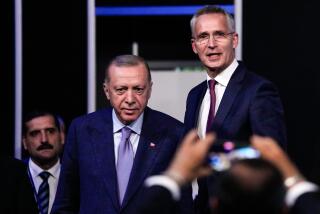The NATO Mold Won’t Fit the Fractious Middle East : Gulf crisis: Baker’s proposed alliance reflects an elite tradition; it lacks common values and popular consent.
- Share via
Secretary of State James A. Baker III has proposed the creation of a regional collective security framework in the Persian Gulf that would be similar to NATO in Europe. This idea, which would include a continuing U.S. military presence in the region, is a legitimate effort to meet long-term security needs, but it could cause more problems than it solves.
To begin with, the analogy between the current situation in the Middle East and post-World War II Europe is unrealistic. So, too, is the expectation that the United States can duplicate its NATO experience in the Persian Gulf, this time allied with Arab governments to contain and defend against an expansionist enemy. In fact, Baker’s proposal will generate comparisons not with NATO, but with the defunct British-sponsored Baghdad Pact and its equally defunct successor, CENTO--the Central Treaty Organization.
The North Atlantic Treaty Organization is fundamentally different from all other U.S.-sponsored regional pacts. NATO is a true partnership among industrialized societies that share a common culture and values. NATO’s principal European members are more or less equal in military and economic power. Thus there has never been a critical worry that one or a few countries would dominate the others, apart from resentment about the preeminent role of the United States.
More important, most NATO members have been democracies--all are, today--whose governments represented a free expression of the will of their peoples. To an unprecedented degree, then, NATO has been an alliance of peoples and not just heads of governments or ruling elites. And NATO members hve always agreed on at least the broad outlines of the character and seriousness of the common threat--communism and Soviet military might.
The contrast with Persian Gulf states is striking. The disparity in their military and economic power would breed client-type relationships rather than true partnerships--just as the members of the Baghdad Pact were looked upon as Western surrogates by their neighbors.
Politically, few if any of the gulf governments are truly representative of their peoples’ will, certainly not as expressed through free elections. Any arrangements between the United States and these governments would commit only individuals or narrow elites, not the people. The Baghdad Pact failed because of Iraq’s revolution in 1958, itself provoked because the royal family had brought Iraq into the pact; CENTO folded with the downfall of the Shah. There is little reason to believe that today’s Persian Gulf governments have more staying power than did the Iraqi Hashemites and the Iranian Pahlavis.
More important, there is no consensus in the Middle East, particularly at the popular level, about the source, character and seriousness of the threat to the region. Many Arabs see the current gulf leadership, not Saddam Hussein, as an impediment to achieving their aspirations, including the fulfillment of Palestinian rights.
Under these circumstances, the United States will be asking for trouble if it tries to create a Persian Gulf NATO. However honorable its intentions, Washington’s attempt to create such an institution would be widely seen in the Middle East as a cover for an effort to gain U.S. hegemony in defense of unrepresentative governments and against Arab interests. The United States would become even more the focus of popular animosity and a target for subversion by forces that will simply find other sponsors if Saddam Hussein is gone.
A significant and permanent U.S. military presence in the Persian Gulf would also create unease in countries beyond the immediate region, including India and China. It is doubtful that a Soviet Union able to express its long-term interests would feel comfortable with such an arrangement so close to its borders: There is just so much that even an empire in decline can accept from its traditional rival.
In this transition period from the Cold War era to a new world order, it is questionable for the United States to fall back on instruments of policy that are typical of the past.
There is a better way for the United States and other countries to cope with phenomena such as Saddam Hussein: Deal with conditions that spawn them--repression, unrepresentative government, abject poverty side-by-side with obscene wealth, personal and group frustrations and national humiliation.
The United States and other Western states should also help to strengthen truly multilateral instruments for conflict resolution and peacekeeping within the context of the United Nations. As demonstrated by the current crisis, the United Nations, with a more cooperative Soviet Union, may begin to function as it was originally designed.
More to Read
Get the L.A. Times Politics newsletter
Deeply reported insights into legislation, politics and policy from Sacramento, Washington and beyond. In your inbox twice per week.
You may occasionally receive promotional content from the Los Angeles Times.










